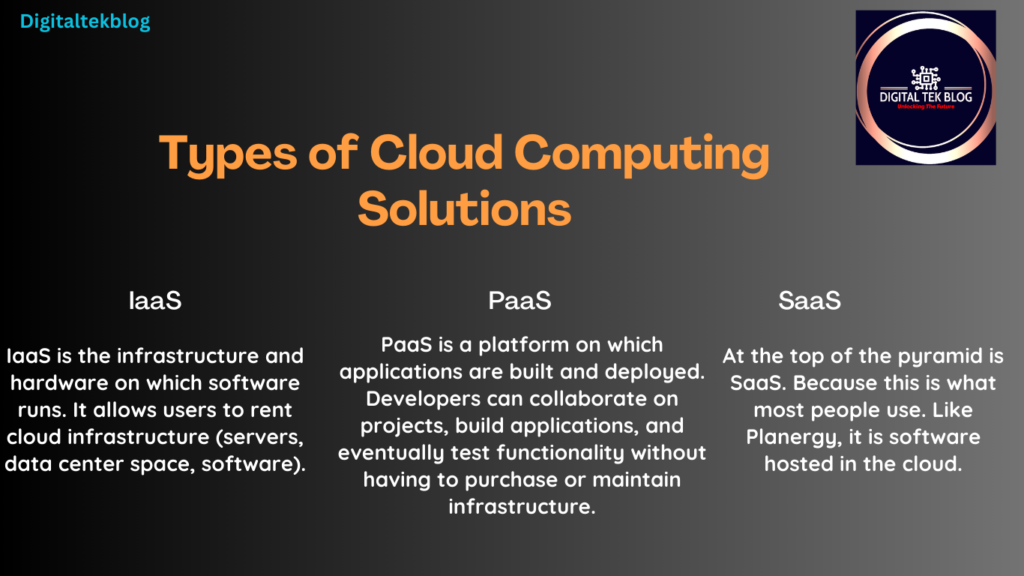Introduction of cloud computing solutions
Cloud computing solutions refer to applications, storage, on-demand services, computer networks, or other resources that are accessed over an internet connection through a shared cloud computing framework from another provider.
What is cloud computing?
The easiest way to think about cloud computing is like electricity.
Your home or business has electricity, but you don’t need an on-site power plant to use it. Just connect to the power plant that supplies electricity to your area.
Cloud computing technology has helped global companies reach new heights. Cloud computing offers the opportunity to replace the upfront capital expenditure of setting up on-premises infrastructure, including servers, network hardware, software, and more. It helps replace the expenditure spent on installing, configuring, testing, maintaining, and fixing scalability issues in on-premises infrastructure.
When using cloud computing solutions, users simply log in to their account and manage their hardware and software infrastructure. Easy access, cost savings, shared infrastructure, faster provisioning, horizontal scaling, efficient maintenance and quick updates, improved security, rich file storage, and multi-tenancy are some of the key benefits of cloud technology.
From startups to large enterprises, Technotree deploys cost-effective, flexible, and scalable cloud computing solutions to reduce infrastructure costs and accelerate business growth by mitigating boundary-agnostic business challenges.
What are the benefits of cloud computing solutions?
- Improved software and hardware performance
- Flexible and cost-effective
- Improved uptime and availability
- Seamless integration
- Improve collaboration with real-time sharing.
Cloud computing solutions offer benefits for both businesses and end users.
Cloud providers have a ‘pay-as-you-go’ model, so businesses offering cloud-based services never pay for more than they use.
This is useful for startups with a limited budget, as it allows you to adjust costs as your company grows. If your business declines for any reason, you can also downgrade your plan accordingly.
You don’t have to worry about investing in upfront infrastructure costs like servers or software licenses.
You also don’t have to worry about an in-house IT team responsible for the maintenance and repair of your equipment.
For end users, cloud computing means being able to access everything from files to email to business applications and more from any device with an internet connection.
You can access your account whether you’re working from your desktop in the office, your laptop at home, or your mobile device on the go. Information is synced in real-time across all your devices, so you don’t have to worry about outdated data or duplicating your work.
As cloud-based approaches grow in popularity and more companies adopt them for their businesses, price points for small and medium-sized businesses (SMBs) are gradually becoming more affordable.
Software-as-a-Service (SaaS) solutions for nearly every business need provide businesses with the tools they need for a fraction of the cost of each user’s license, with access limited to the licensed tools. This is helpful in terms of disaster recovery.
Even if your hard drive crashes, all your important project files are available from the cloud.
With the cloud model, your team can access one app at $33.99/month/license or all apps at $79.99/month/license. This approach is much more affordable for small businesses because the software is always kept up-to-date, and projects can be accessed from anywhere at any time in the cloud.
About Cloud Computing Solutions
More and more companies are moving to the cloud. This trend is not going to end in the IT world. There is certainly a need to move from the traditional software model to the Internet. In particular, cloud computing solutions have steadily gained momentum over the past decade. The future outlook is very promising and beneficial, as next-generation cloud computing solutions are designed to enable collaboration from anywhere through mobile devices.
This allows business users and organizational professionals to access software and applications from anywhere in the world. Computer programs are often hosted by third parties and reside in the cloud. These elements allow business owners to focus on their operations and not worry about managing or controlling the entire process. Simply put, just enjoy the results.
Types of Cloud Computing Solutions

There are three types of cloud computing solutions prevalent in the market.
Infrastructure as a Service (IaaS)
As the name suggests, a third party hosts the infrastructure elements: hardware, servers, storage, and software. We also provide security, maintenance, and software.
Platform as a Service (PaaS)
Platform as a Service (PaaS) is a cloud computing service that allows users to develop, run, and manage applications without worrying about code, storage, or infrastructure. There are many different types of PaaS. All PaaS options are either public, private, or a mix of both.
Software as a Service (SaaS)
Software as a Service (SaaS) is a software delivery model that provides access to cloud applications to customers over the Internet.
Public Cloud vs. Private Cloud vs. Hybrid Cloud
A public cloud is a cloud service offered to multiple customers through a cloud service provider that operates virtual machines. SaaS, IaaS, and PaaS are all part of the public cloud.
On the other hand, a private cloud is a cloud service that is not shared with other organizations. Private clouds can be managed internally or hosted by a third party.
In a public cloud, each customer’s data and applications running in the cloud are not visible to other cloud customers on the same remote server. Data management and data security are the responsibility of the provider.
Public clouds and hosted private clouds are available through cloud computing services like Amazon Web Services (AWS), Microsoft Azure, and Google Cloud Platform. Services like Dropbox and Microsoft OneDrive provide cloud storage for businesses and individuals.
Think of a public cloud like renting an apartment and a private cloud like renting a similar-sized home. Homes are more private, but the rent is generally higher.
Although employees are responsible for apartment maintenance, it’s difficult to ask someone to maintain the house. If a contractor isn’t available, the tenant may have to do it themselves.
A hybrid cloud is a cloud environment that uses a combination of on-premises, private cloud, and public cloud services.
This approach moves workloads between the public and private cloud as needed based on changing computing needs and costs. Businesses that choose this solution will have more flexibility and data usage options.
Investing in a cloud solution makes it easy to get all the software you need to run your business smoothly.
All your business needs are in the cloud, from basic HR functions to employee onboarding and time management to procurement, enterprise resource management (ERP), financial management, and more.
You should know more about the cloud computing platform.
- What is SaaS (Software as a Service)? Advantages and disadvantages
- What is Platform as a Service (PaaS)? Advantages and disadvantages
- Infrastructure as a Service (IaaS) in cloud computing: advantage and disadvantages
- 11 Best Popular Examples Of SaaS in Cloud Computing
- Top 5 Advantages of IaaS in Cloud Computing 2024
- Top 8 Examples of IaaS in Cloud Computing: What You Need To Know In 2024
- Top 9 Cloud Computing Platforms to know in 2024 and Advantages
Why do you need a cloud computing solution?
Cloud computing solutions allow your business to take advantage of resources maintained and secured by cloud service providers on private, secure servers and networks. Cloud solutions provide a clear solution for mobilizing network resources and data.
Depending on the computing power required, the software needed on the server, and many other factors, building an on-premises IT infrastructure can easily cost thousands of dollars.
If your business experiences a power outage, there will be downtime if there is no backup power source. Also, the services provided to customers through that server will be unavailable until the service is restored.
With cloud services, you don’t have to worry about maintaining a data center or keeping it operational.
Custom business applications have traditionally been very complex and expensive to maintain. It requires a lot of software and hardware to run, and it is very cumbersome. In addition, businesses need an in-house team of experts to install, configure, test, run, secure, and update. Cloud computing solutions can reduce these efforts, increase productivity, and allow you to focus more on business results.
Related topics about cloud computing: what you should know about
- Cloud Computing Reference Models: Explanation and Example with Diagrams
- The Ultimate Guide to Cloud Computing: 10 Steps to Implementation Success
- Virtualization in Cloud Computing: 6 Types, Architecture, and Advantages
- 7 Big differences between edge computing and cloud computing: Advantages and disadvantages
- Edge Computing: Definition, Concept, Uses and top 10 best practices cases in 2024
- Cloud Deployment Models: definition, types, comparisons and examples
- Transforming Technology 2024: Explore the Evolution of Cloud Computing Architecture
follow me : Twitter, Facebook, LinkedIn, Instagram


1 thought on “Top 3 Best Cloud Computing Solutions: The Ultimate Guide”
Comments are closed.